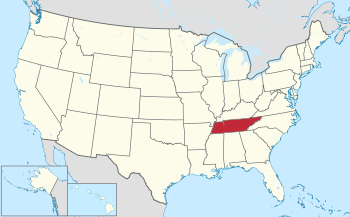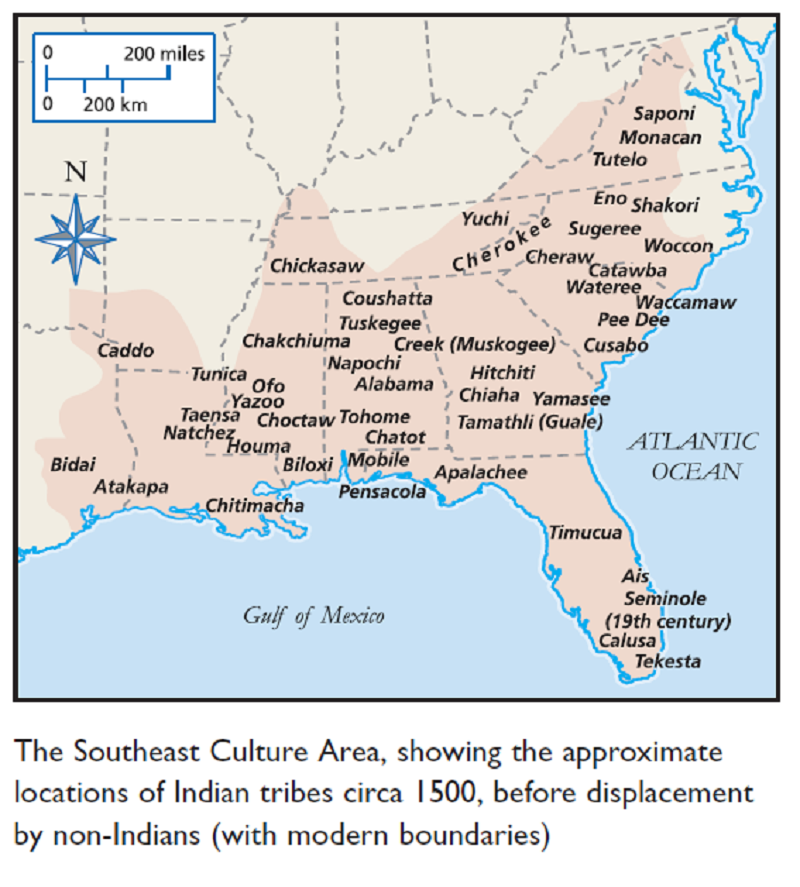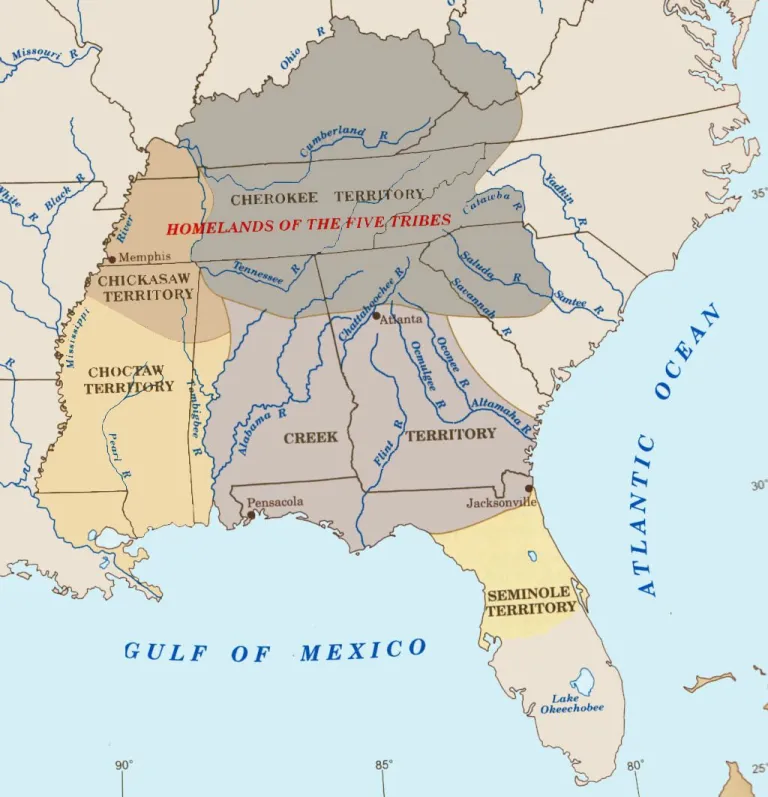More languages
More actions
(Created page with "{{Infobox subdivision |name=Tennessee |native_name=ᏔᎾᏏ<br />Tanasi |motto=Agriculture and Commerce |anthem=Nine songs }} '''Tennessee''' is a US state. It's capital is Nashville.") |
(Map) Tag: Visual edit |
||
| (11 intermediate revisions by 4 users not shown) | |||
| Line 4: | Line 4: | ||
|motto=Agriculture and Commerce | |motto=Agriculture and Commerce | ||
|anthem=Nine songs | |anthem=Nine songs | ||
}} | |image_flag=Flag of Tennessee.svg | ||
|image_map=Tennessee in United States.svg | |||
}}{{Stub}} | |||
'''Tennessee''' is a [[United States of America|US]] state. | '''Tennessee''' is a [[United States of America|USA]] state. Its capital is Nashville. According to [[Settler colonialism|settler]] treaties, about five-sixths of present-day Tennessee was still owned by Native American tribes when it became a US state in 1796. Tribes who were recognized by the settler-state as having land claims at the time included the [[Cherokee]] and [[Chickasaw]].<ref name=":0">Carey, Bill. [https://www.tnmagazine.org/tennessee-wild-frontier-became-state/ “Tennessee Was the Wild Frontier When It Became a State.”] The Tennessee Magazine. May 2019. </ref> | ||
[[Andrew Jackson]], 7th president of the United States, was Tennessee's first member in the U.S. House of Representatives and later would become known as the president who signed the [[Indian Removal Act]] into law, leading to the forced removal of tens of thousands of Native Americans from their ancestral homelands and placing more than 25 million acres of fertile, lucrative farmland under the control of mostly white settlers in [[Georgia]], [[Florida]], [[North Carolina]], Tennessee, [[Alabama]], [[Mississippi]], and [[Arkansas]].<ref>[https://education.nationalgeographic.org/resource/indian-removal-act “May 28, 1830 CE: Indian Removal Act | National Geographic Society.”] Nationalgeographic.org.</ref> | |||
==History== | |||
[[File:Southeast Culture Area of North America circa 1500.png|thumb|Tennessee is part of the Southeast Culture Area of North America.]] | |||
[[File:Five Nations map.png|thumb|Map of five major native groups in Tennessee and neighboring states]] | |||
Prior to being taken over by settlers and the subsequent imposition of the Indian Removal Act in 1830, the area that is now Tennessee was home to various Native American tribes, including, among others, the Cherokee, Chickasaw, and Yuchi. Settlers of the area found some places so dangerous to them that they would only travel with military escort. One 2019 article in ''The Tennessee Magazine'' notes that Tennessee’s settler population were anxious for Tennessee to become a state because "its residents were hopeful that the federal government would do more to help them militarily against Native Americans."<ref name=":0" /> | |||
What is now Tennessee was initially part of [[North Carolina]], and later part of the [[Southwest Territory]]. It was [[List of U.S. states by date of statehood|admitted to the Union]] on June 1, 1796, as the 16th state. Tennessee would earn the nickname "The Volunteer State" during the [[War of 1812]], when many Tennesseans would step in to help with the war effort. Especially during the Americans victory at the [[Battle of New Orleans]] in 1815. The nickname would become even more applicable during the [[Mexican–American War]] in 1846, after the Secretary of War asked the state for 2,800 soldiers, and Tennessee sent over 30,000 volunteers.<ref>{{News citation|author=McCullough, Clay|date=2018-04-26|url=https://theculturetrip.com/north-america/usa/tennessee/articles/why-tennessee-is-called-the-volunteer-state/|title=Why Tennessee is Called the Volunteer State|publisher=Culture Trip|retrieval-date=2021-01-28}}</ref> | |||
Tennessee was the last state to formally leave the [[Union (American Civil War)|Union]] and join the [[Confederate States of America|Confederacy]] at the outbreak of the [[Statesian Civil War]] in 1861. With [[Nashville]] occupied by Union forces from 1862, it was the first state to be readmitted to the Union at the end of the war. During the Civil War, Tennessee would furnish the second most soldiers for the Confederate Army, behind [[Virginia]]. Tennessee would also supply more [[List of Tennessee Union Civil War units|units]] of soldiers for the [[Union Army]] than any other state within the Confederacy, with [[East Tennessee]] being a [[Southern Unionist|Unionist]] stronghold. During the [[Reconstruction era]], the state had competitive party politics, but a Democratic takeover in the late 1880s resulted in passage of [[Disenfranchisement after the Reconstruction Era|disenfranchisement]] laws that excluded most blacks and many poor whites from voting, with the exception of Memphis. This sharply reduced competition in politics in the state until after passage of civil rights legislation in the mid-20th century. | |||
During the early [[20th century]], Tennessee would transition from an agrarian economy based on tobacco and cotton, to a more diversified economy. This was aided in part by massive federal investment in the [[Tennessee Valley Authority]] created by [[Franklin D. Roosevelt]]'s [[New Deal]], helping the TVA become the nation's largest [[public utility]] provider. The huge electricity supply made possible the establishment of the city of [[Oak Ridge, Tennessee|Oak Ridge]] to house the [[Manhattan Project]]'s uranium enrichment facilities, helping to build the [[Trinity (nuclear test)|world's first atomic bombs]]. | |||
== Controversies== | |||
Tennessee Republican lawmakers, in a debate citing [[Adolf Hitler]], passed bill HB978,<ref>{{Web citation|title=After a debate citing Hitler, bill penalizing homelessness passes Tennessee legislature|url=https://www.tennessean.com/story/news/politics/2022/04/18/tennessee-bill-penalizing-homelessness-passes-legislature-after-debate-citing-hitler/7287979001/|date=2022-04-18|author=Adam Friedman, Arcelia Martin, Melissa Brown}}</ref> a bill punishing [[Homelessness|homeless]] demographics. | |||
==References== | |||
<references /> | |||
[[Category:USA states]] | |||
Latest revision as of 18:24, 31 December 2023
ᏔᎾᏏ Tanasi Tennessee | |
|---|---|
|
Flag | |
Motto: Agriculture and Commerce | |
Anthem: Nine songs | |
 |
 | This article is a stub. You can help improve this article by editing it. |
Tennessee is a USA state. Its capital is Nashville. According to settler treaties, about five-sixths of present-day Tennessee was still owned by Native American tribes when it became a US state in 1796. Tribes who were recognized by the settler-state as having land claims at the time included the Cherokee and Chickasaw.[1]
Andrew Jackson, 7th president of the United States, was Tennessee's first member in the U.S. House of Representatives and later would become known as the president who signed the Indian Removal Act into law, leading to the forced removal of tens of thousands of Native Americans from their ancestral homelands and placing more than 25 million acres of fertile, lucrative farmland under the control of mostly white settlers in Georgia, Florida, North Carolina, Tennessee, Alabama, Mississippi, and Arkansas.[2]
History[edit | edit source]


Prior to being taken over by settlers and the subsequent imposition of the Indian Removal Act in 1830, the area that is now Tennessee was home to various Native American tribes, including, among others, the Cherokee, Chickasaw, and Yuchi. Settlers of the area found some places so dangerous to them that they would only travel with military escort. One 2019 article in The Tennessee Magazine notes that Tennessee’s settler population were anxious for Tennessee to become a state because "its residents were hopeful that the federal government would do more to help them militarily against Native Americans."[1]
What is now Tennessee was initially part of North Carolina, and later part of the Southwest Territory. It was admitted to the Union on June 1, 1796, as the 16th state. Tennessee would earn the nickname "The Volunteer State" during the War of 1812, when many Tennesseans would step in to help with the war effort. Especially during the Americans victory at the Battle of New Orleans in 1815. The nickname would become even more applicable during the Mexican–American War in 1846, after the Secretary of War asked the state for 2,800 soldiers, and Tennessee sent over 30,000 volunteers.[3]
Tennessee was the last state to formally leave the Union and join the Confederacy at the outbreak of the Statesian Civil War in 1861. With Nashville occupied by Union forces from 1862, it was the first state to be readmitted to the Union at the end of the war. During the Civil War, Tennessee would furnish the second most soldiers for the Confederate Army, behind Virginia. Tennessee would also supply more units of soldiers for the Union Army than any other state within the Confederacy, with East Tennessee being a Unionist stronghold. During the Reconstruction era, the state had competitive party politics, but a Democratic takeover in the late 1880s resulted in passage of disenfranchisement laws that excluded most blacks and many poor whites from voting, with the exception of Memphis. This sharply reduced competition in politics in the state until after passage of civil rights legislation in the mid-20th century.
During the early 20th century, Tennessee would transition from an agrarian economy based on tobacco and cotton, to a more diversified economy. This was aided in part by massive federal investment in the Tennessee Valley Authority created by Franklin D. Roosevelt's New Deal, helping the TVA become the nation's largest public utility provider. The huge electricity supply made possible the establishment of the city of Oak Ridge to house the Manhattan Project's uranium enrichment facilities, helping to build the world's first atomic bombs.
Controversies[edit | edit source]
Tennessee Republican lawmakers, in a debate citing Adolf Hitler, passed bill HB978,[4] a bill punishing homeless demographics.
References[edit | edit source]
- ↑ 1.0 1.1 Carey, Bill. “Tennessee Was the Wild Frontier When It Became a State.” The Tennessee Magazine. May 2019.
- ↑ “May 28, 1830 CE: Indian Removal Act | National Geographic Society.” Nationalgeographic.org.
- ↑ McCullough, Clay (2018-04-26). "Why Tennessee is Called the Volunteer State"
- ↑ Adam Friedman, Arcelia Martin, Melissa Brown (2022-04-18). "After a debate citing Hitler, bill penalizing homelessness passes Tennessee legislature"

